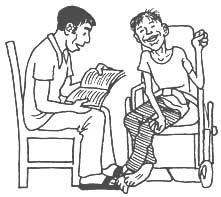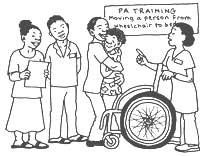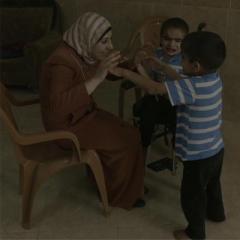Your progress
0%
The activities below are strategies your organization can use to support the provision of effective personal assistance in the communities you serve.
Use your mouse or keyboard to expand each of the activity headings below. To add an activity to your action plan, select the Add button beside it.

It can be difficult for people with disabilities to advocate on their own behalf and it is easier to bring about change by working collectively. CBR therefore needs to work with disabled people’s organizations to establish options for personal assistance.
These organizations can help to:
Learn about the changes a consumer-controlled personal assistance service was able to bring about in Serbia.


In Serbia, after a consumer-controlled personal assistance service was established for the first time, the lives of many individuals were transformed on a personal level, and people with disabilities were mobilized to act collectively.
As a result of the service, one user has become an active disability leader. Previously his life was limited to reading at home with only sporadic visits outside; now, with the support of his personal assistant, he travels three times a week to lead a disabled people’s organization in planning and activities.
This disabled people’s organization has successfully advocated and mobilized the community to establish a local branch office for independent living for people with disabilities. The office space was provided by the local municipality.

It is important to ensure that personal assistance is appropriate to the social and cultural context, and sensitive to gender and age-related needs.
CBR can help people with disabilities to:
Learn about a programme established by a disabled people’s organization in the Philippines to provide training to personal assistants.

To be effective, both people with disabilities and their personal assistants require training that gives them the confidence and skills they need. People with disabilities need to be able to express their needs and expectations clearly to ensure that they receive personal assistance of good quality. CBR can support people with disabilities to:
Opportunities for training may be available through a number of sources, including disabled people’s organizations and self-help groups, local governmental and non-governmental organizations and CBR organizations.

It is important for personal assistants to be confident and competent in their roles and responsibilities. In many situations personal assistants, particularly those who provide support on an informal basis, will not have received any training for the tasks they carry out. Training is important for personal assistants, to understanding their role and its limitations.
Observe how a CBR worker helped a family learn how to provide appropriate personal care for two young boys.

Family members who provide personal assistance often do so in addition to their other roles and responsibilities, and with little or no support. This often leaves them exhausted with little time for their own needs. CBR should make effort to provide support for family members by:
When support systems break down, the needs of people with disabilities must continue to be met. It is essential that CBR plan in advance with other stakeholders to ensure they are prepared to respond to a crisis.
Communities are a rich source of support and can provide resources and flexible options especially during times of crisis. Community solutions will usually be the most appropriate and effective in both the immediate and longer term.
CBR managers should work with disabled people’s organizations and local authorities to agree upon strategies for managing a crisis in advance. Some possible options to explore before a crisis happens are:
|
This team might include:
|
|
Options might be available in facilities that offer respite care or rehabilitation. |
|
These facilities need to be modified if necessary to ensure access for women and girls with disabilities. |
|
If not, can disabled people’s organizations and CBR support this training? |
|
|
|
|
|
Traditionally people with disabilities who needed a high level of personal assistance were sent to institutions. While this situation is changing, institutions do still exist in many countries, but institutional care violates human rights according to the CRPD Article 19. CBR and disabled people’s organizations need to workto close existing institutions and prevent new ones from being built.
Countries that have moved away from institutional care have successfully converted their institutions into independent housing, where people with disabilities can live independently with some support available as needed or respite accommodation, where they can stay for short breaks while family members take a break from their roles as personal assistants.